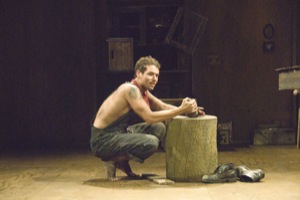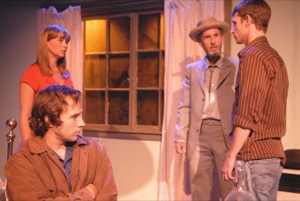-
- Court makes Conn. third state to allow same-sex marriage
- Same-sex marriage ban attracts big money in California
- Mormons recruit out-of-state for same-sex marriage ban
- 10 years after Shepard, no federal hate crime law
- U.S. gay candidates expect Election Day breakthrough
- Ark. plans to drop unmarried foster parent ban
- National News Briefs
- World News Briefs
Theater
Of obsession and poverty
Published Thursday, 16-Oct-2008 in issue 1086
The Lesters live in a disintegrating shack in rural Georgia outside Augusta, in what was tobacco country until overfarming depleted the soil. Now sharecropper Jeeter (John Fleck), his malnourished wife Ada (Jan Leslie Harding) and what’s left of their family are drying up along with the weather and their survival possibilities.
La Jolla Playhouse presents Jack Kirkland’s 1933 adaptation of Erskine Caldwell’s novel Tobacco Road through Oct. 26 at the Mandell Weiss Forum. David Schweizer directs.
Written in the throes of the Depression, the inhabitants of Tobacco Road display grit and determination, but also the desperation and hopelessness their situation inspires. Savage humor, shocking (for the time) sexuality and laughably phony religiosity are on display.
Jeeter, patriarch of the Lester clan, talks a big game about loving the land and wanting to plant, but in fact is lazy and would prefer to sit around talking about it. Lacking money and seed, Jeeter even refuses his wife’s entreaties to move to town where there is work in the mill but thinks nothing of selling his youngest daughter Pearl (Mary Deaton) into marriage with Lov Bensey (Chris Reed), a hulking slob of a man with whom she refuses to share a bed.
Jeeter’s son Dude (Sam Rosen), lazy as his father, is content to bounce a ball against the crumbling house walls until itinerant widow and self-proclaimed preacher Sister Bessie (Catherine Curtin) sets her sights on wedding the teenager and offers to buy him a car to seal the deal.
The other offspring still at home, 18-year-old Ellie May (Kate Dalton), cannot conceal her lust but is stymied in her search for love by a harelip. Wandering through the place is aged Grandma (Lucy Ann Albert), stooped and either ignored or treated worse than a dog by her family.
It’s a grim portrait Kirkland portrays of one family displaced by and unable to adjust to changing economic times.
Fleck’s Jeeter is thin and reptilian, with ill-concealed anger and violence just beneath the surface. Harding’s Ada has seen it all, tried to hold it together, but is so beaten down and undernourished she looks like a stick figure. Albert’s Grandma and Dalton’s Ellie May, with her painful but evident need for human connection, are wonderfully portrayed but difficult to watch. Rosen’s empty-headed Dude, Reed’s hulking insistence as Bensey, and Deaton’s plucky Pearl round out the major characters.
Curtin provides welcome comic relief as Sister Bessie, the itinerant preacher whose religious needs just happen to correspond to her carnal desires.
Tobacco Road ran for seven-and-a-half years (making it the second longest-running drama in Broadway history, behind Life With Father) despite being universally panned by the critics. It has seldom been produced since. Playhouse artistic director Christopher Ashley didn’t realize how prescient he was when he scheduled this a year ago, before the current stock market roller coaster ride began. It is, alas, more relevant than ever.
Kudos to David Zinn for the terrific set and costumes, to Christopher Akerlind for his lovely lighting design and to composer/sound designer Shahrokh Yadegari for adding considerably to this fine production.
Tobacco Road plays through Oct. 26, at La Jolla Playhouse’s Mandell Weiss Forum. Shows Tuesday and Wednesday at 7:30 p.m.; Thursday through Saturday at 8 p.m.; Sunday at 7 p.m.; matinees Saturday and Sunday at 2 p.m. For more information, visit www.gaylesbiantimes.com/links/1086.
The dichotomy between the desire for freedom and the need for roots plays out in Sam Shepard’s Fool For Love, at New Village Arts Theatre through Oct. 26. Dana Case directs the 1984 Obie winner and Pulitzer Prize nominee.
Weary and desolate, May (Kristianne Kurner) sits on the bed, head in hands and staring at the floor. May’s former lover Eddie (Joshua Everett Johnson) has arrived uninvited and unannounced, and is at the worn table, trying to cajole her into moving back in with him. A rodeo stuntman, Eddie’s cowboy appearance and air of self-confidence make him attractive to women, but after a rocky 15-year relationship, his casual attitude toward fidelity and a barely-concealed leaning toward violence have given May the impetus to leave him.
But these are two sick puppies, victims of a sexual obsession which hasn’t abated, even since the discovery that they are half-brother and sister (“You’re like a disease to me,” she says). Eddie has tracked her down, and an air of inevitability hangs over them like a pall. May exhibits the push-pull psyche of a woman who knows she’s been had and has escaped, but still has difficulty letting go.
Nonetheless, May (inconveniently enough for Eddie) has a date with a new and soon-to-be-bewildered gentleman named Martin (Greg Wittman), who isn’t sure about this box of snakes he’s stepped into.
Meanwhile, the Old Man (Jack Missett) sits in an old rocking chair, pouring whiskey and occasionally addressing the other characters. Probably a figment of their imagination, he is the father who had two families and regularly deserted each.
Shepard made his name writing about the male psyche, but here gives us his most fully realized female character. May has spent most of her life in need, but at the end of the play it is she who escapes her four-walled confinement and strikes out on her own.
Shepard’s plays are as much about image as plot (perhaps explaining why he’s also a successful screenwriter), and this one is no exception. The sight of Eddie practicing rope tricks on the bedposts, or May inching along the walls, trying to take refuge in their solidity tells you more about the characters than pages of dialogue or exposition.
Kurner has a good handle on May’s strengths, contradictions and neuroses. We can almost feel the anguish of her need to let go complicated by the power of her obsession. Johnson may look a little spindly for a cowboy, but he projects both longing and menace just fine.
This is no comedy, but it’s a pleasure to watch these actors at the top of their form stalk each other like big cats and move in for the kill. Kudos to Case for her fine direction as well.
Fool for Love plays through Oct. 26, at New Village Arts Theatre. Shows Thursday through Saturday at 8 p.m.; matinees Saturday at 3 p.m. and Sunday at 2 p.m. For more information, visit www.gaylesbiantimes.com/links/1086.
|
|
Copyright © 2003-2025 Uptown Publications



